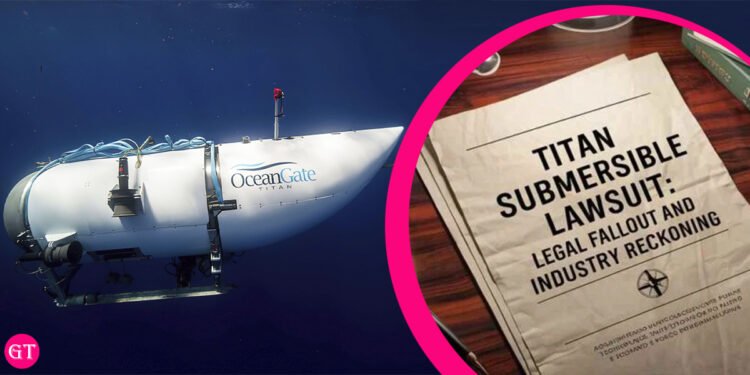In June 2023, the world watched with anxiety and sorrow as news broke of the missing Titan submersible during a deep-sea expedition to the Titanic wreck site. The vessel, owned and operated by OceanGate, carried five individuals, including OceanGate CEO Stockton Rush, British billionaire Hamish Harding, Pakistani businessman Shahzada Dawood and his son Suleman, and renowned Titanic expert Paul-Henri Nargeolet. What began as a groundbreaking adventure ended in a catastrophic implosion deep beneath the Atlantic Ocean.
The aftermath of the incident has ignited legal debates and sparked a series of lawsuits. Families of the victims are seeking accountability, while the broader industry grapples with the risks of unregulated deep-sea exploration. The Titan submersible lawsuit has become a defining moment in the legal and ethical assessment of private adventure tourism.
What Happened to the Titan Submersible?
The Titan submersible vanished on June 18, 2023, just hours after beginning its descent to the Titanic wreck, nearly 12,500 feet beneath the ocean’s surface. Communication with the surface vessel was lost, triggering a massive international search and rescue operation. After four tense days, debris from the Titan was discovered, confirming a catastrophic implosion that killed all five aboard.
The implosion likely occurred within hours of the descent, yet families and the public were left without confirmation for days. Investigations revealed the sub’s carbon fiber design and structural limitations may have played a critical role. Engineers and marine experts had previously warned OceanGate about these risks, raising questions about the company’s safety protocols.
OceanGate and Its Role
OceanGate was a pioneering company in the field of underwater exploration, but its bold approach to innovation has come under intense scrutiny. Founded by Stockton Rush, who also piloted the Titan during its fatal dive, OceanGate promoted itself as a trailblazer in making deep-sea travel more accessible to civilians and researchers.
However, the company operated in a legal gray area, largely bypassing third-party safety certification. OceanGate claimed its methods were “innovative” and not suitable for traditional assessment. Internal documents and emails released after the incident reveal that several engineers had expressed concerns about the integrity of the vessel’s hull and warned of potential failure under extreme pressure. Despite these concerns, OceanGate continued commercial operations.
Legal Grounds Behind the Titan Submersible Lawsuit
Following the tragedy, multiple lawsuits have emerged targeting OceanGate and its associated entities. The central legal claims include negligence, wrongful death, and product liability. Victims’ families argue that the company knowingly operated a vessel with structural flaws and failed to provide adequate safety measures.
One of the most significant points of contention is the liability waiver signed by all passengers. These waivers stated that participants understood the risks, including death. However, legal experts argue that waivers do not absolve a company from gross negligence or misconduct, especially when preventable dangers were ignored. This will be a pivotal factor in how courts assess liability.
Major Lawsuits Filed So Far
Among the lawsuits gaining national attention is the one filed by the family of Paul-Henri Nargeolet. The wrongful death suit seeks $50 million in damages, citing pain, suffering, and emotional distress. The complaint states that the passengers likely endured moments of terror before the sub’s implosion and that OceanGate concealed known dangers.
Another notable case involves Hong Kong heiress Karen Lo, who filed a lawsuit against travel consultant Henry Cookson. She had paid over $850,000 for a canceled dive that was originally scheduled years prior but never materialized. Though not aboard the fatal voyage, Lo argues that the delays, poor communication, and eventual cancellation due to the Titan’s issues entitle her to a full refund and compensation.
Industry Accountability and Expert Opinions
The Titan submersible lawsuit has reignited debates around the regulation of extreme tourism. At present, deep-sea tourism lacks the stringent oversight seen in aerospace or maritime transport. This legal vacuum allowed companies like OceanGate to bypass industry standards in the name of innovation.
Maritime law experts suggest that governments must introduce international frameworks for submersible safety and passenger protection. As deep-sea and even space tourism grow in popularity, clear standards and enforcement mechanisms are becoming essential. The Titan disaster may well be the turning point that prompts new legislation.
Broader Implications for the Exploration Industry
For the private exploration industry, the Titan incident has served as a wake-up call. Once seen as the frontier of human discovery, unregulated exploration now faces skepticism from investors, insurers, and governments. The legal implications extend beyond OceanGate and could redefine how extreme travel is approached in the future.
Companies now face increased pressure to prioritize safety over spectacle. As lawsuits progress, there is a strong likelihood that courts will set precedents for how risk, liability, and consent are handled in commercial exploration. This could reshape the operational models of companies involved in space flights, polar treks, and other high-risk ventures.
Emotional and Ethical Dimensions
Beyond the legal battles, the Titan submersible tragedy left a deep emotional toll. Families lost loved ones in a preventable disaster, and the public mourned a group of individuals who pursued knowledge and exploration. The ethical debate surrounding the event touches on the boundaries of human ambition and the price of pushing those limits.
Critics argue that OceanGate prioritized fame and fortune over safety. Proponents of exploration caution against halting innovation due to one company’s mistakes. The lawsuit, therefore, is not just about financial compensation—it is a reflection of society’s values when confronting the dangers of discovery.
Conclusion
The Titan submersible lawsuit represents more than a legal battle—it is a reckoning for an industry that has outpaced regulation. The implosion that took five lives shocked the world, but the response in courtrooms and legislative halls may shape how we pursue exploration moving forward.
As the lawsuits develop, they will test the limits of liability, the strength of legal protections, and the value society places on life in the face of risk. While innovation must continue, it should never come at the expense of accountability and human safety.
READ MORE : The Life and Legacy of Rosie Rivera: TV Star, Advocate, and Entrepreneur
FAQs
What is the Titan submersible lawsuit about?
The Titan submersible lawsuit involves legal actions against OceanGate and associated parties after the implosion of their deep-sea vessel during a Titanic expedition, which resulted in five deaths.
Who are the families suing OceanGate?
The family of Paul-Henri Nargeolet has filed a high-profile wrongful death lawsuit, while others, including clients like Karen Lo, are pursuing legal action over financial losses and safety concerns.
Did passengers sign a waiver before the dive?
Yes, all passengers signed waivers acknowledging potential risks, including death. However, these waivers may not protect OceanGate if gross negligence is proven in court.
How could the lawsuit impact the future of deep-sea tourism?
This lawsuit could set a precedent for safety regulations, insurance policies, and legal accountability in extreme tourism ventures like deep-sea or space exploration.
Is OceanGate still operating after the Titan tragedy?
OceanGate suspended all operations following the tragedy. The company faces lawsuits, investigations, and growing public and legal scrutiny.







